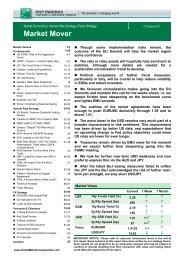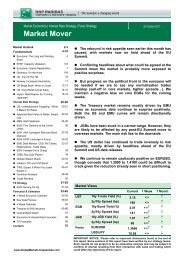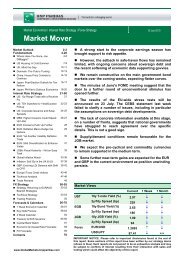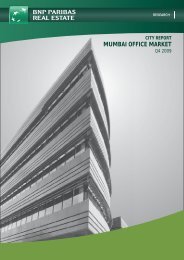Market Economics | Interest Rate Strategy - BNP PARIBAS ...
Market Economics | Interest Rate Strategy - BNP PARIBAS ...
Market Economics | Interest Rate Strategy - BNP PARIBAS ...
Create successful ePaper yourself
Turn your PDF publications into a flip-book with our unique Google optimized e-Paper software.
Capitalism requires business cycles<br />
There has been much admiration for the Chinese<br />
state-controlled economic model. We predicted that<br />
China in 2009 would be the anchor of stability for the<br />
global economy and so it turned out. However, we<br />
are not sure that the same can be said for the next<br />
12 months. Yugoslavia showed that a statecontrolled<br />
market economy cannot ignore the need<br />
for business cycles to correct wasteful investment.<br />
The business cycle works in the capitalist economy<br />
as a quality control for the efficient use of resources.<br />
Business cycles are necessary and useful. In its<br />
2006 stability report, the IMF illustrated that delaying<br />
cyclical downturns only makes the following<br />
recession deeper and more painful. In this sense, the<br />
absence of a Chinese business cycle is worrying and<br />
implicitly suggests that there must be a certain<br />
degree of wasteful investment in the economy which<br />
at one point will have to be cleared out. What should<br />
not be forgotten either is that wasteful investment<br />
reduces efficiency, turning a competitive and noninflationary<br />
economy slowly into a non-competitive<br />
and inflationary one.<br />
130<br />
120<br />
110<br />
100<br />
90<br />
80<br />
70<br />
Graph 5: USD – CNY REER gap has Widened<br />
by 30%<br />
Jan-94<br />
Apr-95<br />
J u l -96<br />
O c t -97<br />
Jan-99<br />
Apr-00<br />
Jul-01<br />
Oct-02<br />
Source: Reuters Ecowin Pro, <strong>BNP</strong> Paribas<br />
CNY Broad BIS REER<br />
Jan-04<br />
A p r- 05<br />
USD Broad BIS REER<br />
Chart 6: Chinese Shares have Underperformed<br />
Jul-06<br />
Oct-07<br />
Jan-09<br />
Apr-10<br />
Does that mean the consensus has started the year<br />
with a wrong distribution of risk preference? Most<br />
think that the main risk of economic<br />
underperformance should be associated with the US.<br />
They have allocated their currency portfolios<br />
accordingly, using the USD as a funding currency.<br />
Along with a better-than-expected performance by<br />
the US economy, Asia’s inflation rate could<br />
undermine this investment strategy.<br />
The meaning of inflation for currency markets<br />
Indeed, the economic outlook for China and by<br />
extension Asia depends on the seriousness of the<br />
current inflation wave. The consensus sees inflation<br />
as mainly driven by commodity-driven cost-push<br />
effects. If this assumption proved correct, current<br />
prices would stabilise within a year. What we find<br />
disturbing is that the rhetoric has taken the same<br />
angle as in the early 1970s when the Yom Kippur<br />
war triggered the first oil price shock. Then, It was<br />
argued that higher oil prices would reduce real<br />
disposable income and would in fact prove to be<br />
deflationary in the long run. Hence they did not<br />
require attention from monetary authorities. This view<br />
backfired in the 1970s, a decade when inflation<br />
proved a real problem. <strong>Interest</strong>ingly, the 1960s had<br />
seen a sharp expansion of the monetary base,<br />
exceeding GDP by a multiple. Over the past couple<br />
of years, the same has happened on a global scale.<br />
That is good enough reason in our view to discuss<br />
what will happen on FX markets, should inflation<br />
become a theme.<br />
Changing the way we look at FX<br />
Source: Reuters Ecowin Pro, <strong>BNP</strong> Paribas<br />
First, we will have to change the way of analysing FX<br />
markets. During the time of the ‘Great Moderation’,<br />
central bank credibility advanced to ever-higher<br />
rates, allowing us to use nominal interest rate and<br />
yield differentials to predict currencies. At times of<br />
corporate-dominated cross-border flows, we used<br />
corporate bond market yields but, most of the time,<br />
sovereign flows dominated cross flows anyway,<br />
keeping the emphasis on sovereign yield<br />
differentials.<br />
When inflation comes back, it will be real yield<br />
differentials that tell us if currencies have upside or<br />
downside potential.<br />
The relative credibility of central banks will<br />
determine the value of FX<br />
Secondly, central banks will be differentiated<br />
according to their willingness to tackle inflation head<br />
on. In the case of Indonesia and India, markets have<br />
started expressing doubts, putting their asset<br />
markets under selling pressure. The selling pressure<br />
Hans Redeker 20 January 2011<br />
<strong>Market</strong> Mover, Non-Objective Research Section<br />
61<br />
www.Global<strong>Market</strong>s.bnpparibas.com

















